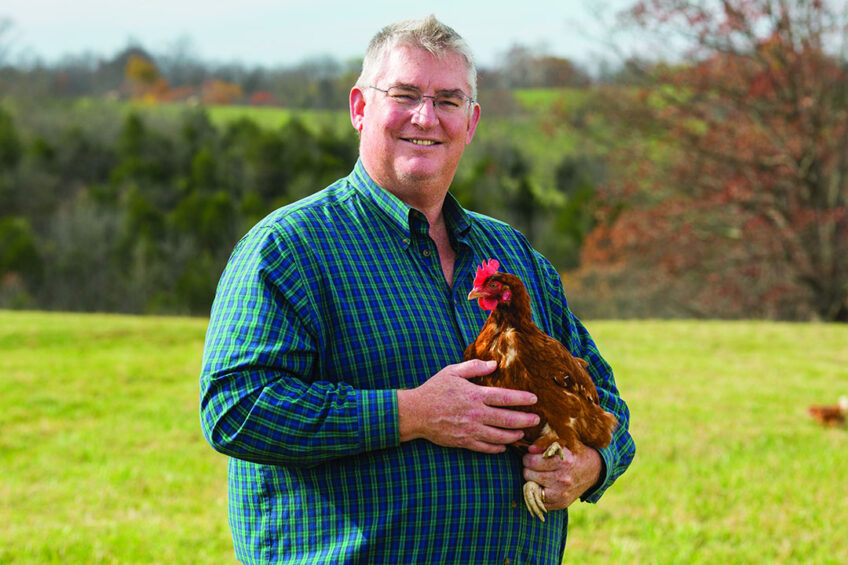US farm pushing forward free-range egg sales

The American egg market is undergoing a structural change with businesses rapidly rejecting caged hens in favour of barn, free-range and organic alternatives. One company at the forefront of the free-range movement tells Poultry World how it does business.
In 2016, 2 of the US’s largest buyers of eggs from American farms said they would phase out the sale of eggs from caged hens: the world’s biggest retailer Walmart and the fast-food giant McDonald’s. Their announcement marked the beginning of a major change in the American egg market and ever since companies have been making similar announcements and transitioning their supply chains away from caged eggs. While cage-free – or barn – reared eggs are most likely to feature as the largest segment of the market, there is increasing demand for free-range, organic, and other speciality tiers of egg.
Farm facts: Egg Innovations
• Founded in 1999
• Consumer brand Blue Sky Farms established in 2013
• PECKISH Peck Packs – a hardboiled snack – launched in 2020
• 50 family farms supplying the business with 1.1 million eggs a day (400 million a year) laid by 1.4 million hens
Blue Sky Family Farms takes advantage of interest in cage-free production
One company well placed to take advantage of Americans’ increasing interest in cage-free is Egg Innovations which, along with its consumer brand Blue Sky Family Farms, has been forging ahead with free-range production for some time. Its farming roots date back more than 100 years, according to chief executive John Brunnquell, who comes from a homestead close to Port Washington, Wisconsin. The farm and the business sell only either free-range or pasture-raised eggs. He says free-range is becoming ever-more popular with American shoppers increasingly concerned about the welfare of the animals that produce their food.

Growing part of population places high value on animal welfare
“Shoppers support it because a growing part of the population places a high value on animal welfare. Those in the millennial generation, specifically, have now grown up and are making more decisions for themselves and their families, and have a greater discretionary income to spend on brands that align with their values.” John tapped into this trend and has built up a business that is a major player in the American free-range and pasture-raised egg movement. “We see the cage-free market exceeding 60% of production and free-range exceeding 25%. The loser will continue to be commodity or caged eggs,” he says.
American Egg Market
• Americans eat 287.1 eggs per capita which makes the country one of the world’s biggest egg consumers
• In addition to world-leading consumption, the US is a major exporter of eggs and egg products
• Iowa, Indiana, Ohio, and Pennsylvania are the top-4 egg producing States
• The number of cage-free hens is growing rapidly – there are now close to 70 million birds in such systems, according to the American Egg Board
Egg production across the Midwest
The company works with more than 50 family farms with 1.4 million hens cared for to high welfare standards. Producers are located across the Midwest in Indiana, Illinois, Wisconsin, Ohio, and Kentucky. John says the welfare standards on their farms are: “The highest in the nation”. Birds are stocked at 22ft2 (2m2) per hen outdoors for free-range and 108ft2 (10m2) for pasture-raised birds.

“We practice regenerative farming techniques because they’re good for the soil, the air, the earth and, of course, our chickens,” John states. “Our fundamental thesis and research have been focused on the 5 chicken behaviours (perching, scratching, dustbathing, socialising, pasturing) and what chickens are hardwired to do. When chickens are allowed to do these things, as they are on our farms, they perform at a high level.”
The farms are certified by a range of organisations centred around bird welfare, including the American Humane Association, Humane Farm Animal Care, United Egg Producers, Kosher, USDA Organic, and Non-GMO product verified.
Marketing welfare is critical
Making sure customers understand the difference between their higher welfare products is critical, according to Lauren Egan, vice president of Brand and Innovation at Egg Innovations. “Brand strategy and messaging are incredibly important in building trust in the mind of consumers not only to help educate them on the differences between free-range, cage-free, pasture-raised, organic and non-GMO,” she says. “But also about the difference between the certifications they see on our packaging and how we differ from other brands in the category.”
“Consumers are definitely more concerned with animal welfare than ever before which we are seeing with the growth of the specialty egg category, driven primarily by Free-Range and Pasture-Raised. Our strategy will evolve to invite the consumer not only to make more informed decisions on animal welfare, but also guide them towards a more holistic understanding of why and how chicken welfare and regenerative farming must work in harmony so that we can leave the planet in a better state than where we started.”
Long-term arrangement with the farmers
Egg Innovations says it enters into long-term agreements with its farmer suppliers. “Fostering a strong rural economy for generations of family farmers to come has been a part of our DNA since day one. We practice this commitment by partnering with farmers to equitably shoulder the risk while reinvesting back into their farm network,” says John.
In common with many integrated poultry businesses, risk is shared, and margins managed between the egg packer and the farmer supplier. “In order to build sustainable futures, we provide our farm partners with the industry’s longest contracts and pay above average market prices to ensure their families have a sustainable living wage.”
Farmers provide the barns, utilities, and labour for the operation, while Egg Innovations supplies the point-of-lay pullets and “nutrient-rich organic non-GMO grain at a fair, fixed price that isn’t impacted by market fluctuations,” he explains. “Egg Innovations supports farmer partners with year-round access to resources such as veterinarians and nutritionists. The farmers benefit from transportation efficiencies and farming operations experts.”
Join 31,000+ subscribers
Subscribe to our newsletter to stay updated about all the need-to-know content in the poultry sector, three times a week. Beheer
Beheer











 WP Admin
WP Admin  Bewerk bericht
Bewerk bericht